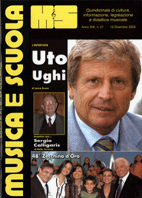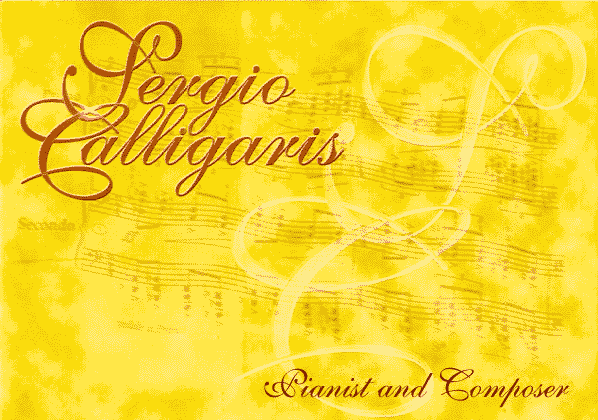 MUSICA E SCUOLA, Year 19th - Nr.21
MUSICA E SCUOLA, Year 19th - Nr.21
(Gioiosa Editrice - Sannicandro Garganico, FG)
December 2005 (page 27):
A meeting with...
Sergio Calligaris,
by Walter Tortoreto
In its program of artistic raising, supported by a hidden but precious work for
internal reorganization, the Association of I Solisti Aquilani meets Sergio Calligaris'
music.
Of the well-known Italian-Argentinian musician, I Solisti performed three demanding works
in three different evenings (23rd and 30th July and 24th August), set in a frame of pages
of the Eighteenth and Nineteenth-Century entrusted to the violins of Stefania Franchini,
Melanie Budde and Laura Gorna, to the cellos of Massimo Magri and Fernando Caida Greco and
to the pianism of Stefania Mormone and Calligaris himself. In the occasion of the last
date in Rocca di Mezzo, Maestro Calligaris, with the courtesy distinguishing him, answered
our questions.
Maestro, three works of yours in three different concerts make think to a tribute
similar to the famous "beneficiate" in the nineteenth century.
I do actually feel honoured from this important acknowledgement. Those three works
refer to different periods but they are united by a writing whose style is immediately
recognizeable. The event, presented by the President of the Consortium for the cultural
development of the Rocche, Giovanni Cocciante, together with the managers of the Solisti
Aquilani, contributes to the cultural and turistic raising of a territory which has been
imposing itself in national field with numerous and valid initiatives.
You currently conserve a vast fame in the Abruzzi. What memory do you have of your
years spent in this region?
I worked for a long time in the Abruzzi, at the Conservatories of Pescara and L'Aquila,
after having taught in the United States and in Naples, and I am often in touch with my
pupils, some of whom are excellent musicians. But in spite of leaving L'Aquila, not so
much time ago yet, I have not interrupted my work ties because I come to these wonderful
mountains on holiday and I can compose in absolute meditation. The serenity of these
places supports both the inspiration of creating the thematic structure of my pieces and
the hard task at my small table, when all themes are combined in the various movements and
in the form of each movement.
You anticipated the raising of the tonal music, from which you never went away?
It is a matter of coherence. I feel myself a man of my time and, in fact, my themes,
those more relaxed as well as the stormy or even brutal ones, arise from everyday life.
But I avoid the labyrinths of certain experimentations because I aspire to an expressive
music.
In my music I tell my time's life, with the melancholy or the storms that difficulties
stir up in our heart, the engrossed contemplation of certain adagios or the energy, the
violence, the rhythmic freedom of other episodes. And the mystery where we live or the
dream… Opus 36 for Strings of 1995, the Concerto for Strings of the 1989 and the
Doppio Concerto Opus 37 form a sort of sound fresco of our life in all its aspects.
You recently received an important international acknowledgement. What is it about?
Last year I was awarded with the Prize as International Musician of the Year by the
International Biographical Centre of Cambridge.
It is a prestigious commendation granted only to very few musical personalities of certain
international influence. A commission of specialists selects thousands of musical
biographies before taking a decision.
The Prize numbers 142 editions. You can therefore understand my joy and satisfaction for
an acknowledgement of such exceptional importance.
Walter Tortoreto

